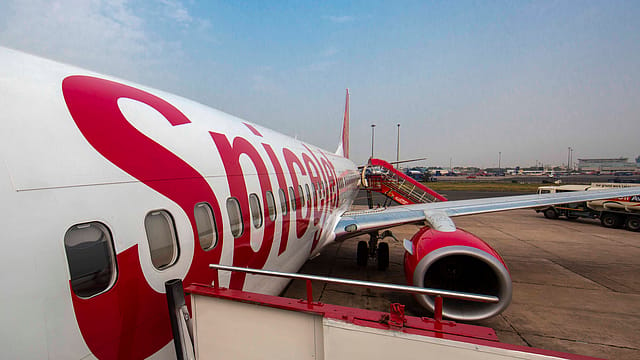SpiceJet sends 80 pilots on leave without pay for 3 months
ADVERTISEMENT

Amid mounting losses, the domestic carrier SpiceJet Ltd has sent about 80 pilots on leave without pay for about three months in order to "rationalise cost". The airline, which is struggling amid government restrictions over repeated snags, and high operational costs on account of the depreciating rupee and high aviation fuel prices, says the prolonged grounding of its MAX fleet has led to excess pilots at the company.
The SpiceJet share is trading 3.67% down at ₹41.95 on the NSE today.
The company has not mentioned the exact number of pilots placed on leave without pay but media reports say the number to be around 80. "In a temporary measure to rationalise cost, SpiceJet has decided to place certain pilots on leave without pay for a period of three months. This measure, which is in line with SpiceJet’s policy of not retrenching any employee which the airline steadfastly followed even during the peak of the Covid pandemic, will help rationalise the pilot strength vis-à-vis the aircraft fleet," says a SpiceJet spokesperson.
In 2019, SpiceJet inducted over 30 aircraft after the grounding of the 737 MAX aircraft by the DGCA. SpiceJet says it continued with the planned pilot induction programme in the hope the MAX would be back in service soon. "However, the prolonged grounding of the MAX fleet resulted in many excess pilots at SpiceJet."
The airline claims it'll induct MAX aircraft soon, and these pilots will be back in service as the induction begins. During their leave without pay period, the pilots will be eligible for insurance benefits and employee leave travel.
Placing some pilots on leave without pay will not hamper its operations, it says. "Even after placing certain pilots on leave without pay, SpiceJet will have a sufficient number of pilots to operate its full schedule as and when the DGCA restriction on flights is lifted."
The Ajay Singh-led airline has had a rough run since the start of the Covid pandemic in India. According to the SpiceJet chairman and MD, the industry saw one of the most severe operating environments in the recent past. "Record high ATF prices and depreciating rupee were the major contributors.”
The market share of SpiceJet has also declined from 8% in July 2022 to 7.9% in August 2022, shows the latest DGCA data. In its interim order in July, the DGCA had directed SpiceJet to restrict its flights to 50% of the number of approved departures for about eight weeks, saying it failed to establish a "safe, efficient, and reliable" service. The decision was taken after repeated incidents of technical snags in SpiceJet planes. Currently, of the total fleet of 90 planes, SpiceJet is using around 50 a day to operate its flights.
The company continues to bleed losses. It incurred a net loss of ₹789 crore in the first quarter of 2022-23. The airline had reported a ₹729 crore loss in the quarter that ended June 30, 2021. Excluding a one-time forex loss of ₹369 crore in the April-June quarter, SpiceJet said its Q1 loss amounts to ₹420 crore. Its revenue, however, rose to ₹2,478 crore against ₹1,266 crore in the same quarter last year.